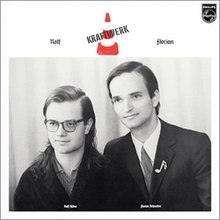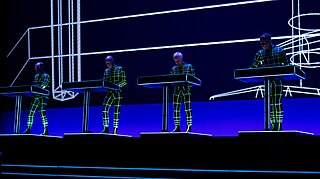
Kraftwerk are a German electronic band formed in Düsseldorf in 1970 by Ralf Hütter and Florian Schneider. Widely considered innovators and pioneers of electronic music, Kraftwerk were among the first successful acts to popularize the genre. The group began as part of West Germany's experimental krautrock scene in the early 1970s before fully embracing electronic instrumentation, including synthesizers, drum machines, and vocoders. Wolfgang Flür joined the band in 1973 and Karl Bartos in 1975, expanding the band to a quartet. Since the band's formation, it has seen numerous lineup changes, with Hütter as its only constant member.

Kling Klang is the private music studio of the band Kraftwerk. The name is taken from the first song on the Kraftwerk 2 album. The studio was originally located at Mintropstraße 16 in Düsseldorf, Germany, adjacent to Düsseldorf Hauptbahnhof, but in mid-2009 moved to Meerbusch-Osterath, around 10 kilometers west of Düsseldorf. The band also operate a record label named Kling Klang, which they use to release their music.
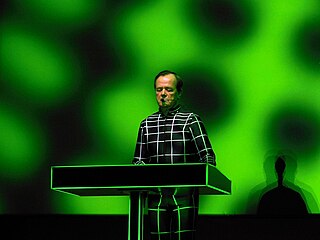
Ralf Hütter is a German musician and composer best known as the lead singer and keyboardist of Kraftwerk, which he founded with Florian Schneider in 1969. On 12 May 2021, Kraftwerk was announced as one of the inductees of the Rock and Roll Hall of Fame.

Autobahn is the fourth studio album by German electronic music band Kraftwerk, released in November 1974 by Philips Records. The album marked several personnel changes in the band, which was initially a duo consisting of Florian Schneider and Ralf Hütter; later, the group added Klaus Röder on guitar and flute, and Wolfgang Flür on percussion. The album also completed the group's transition from the experimental krautrock style of their earlier work to an electronic pop sound consisting mostly of synthesizers and drum machines. Recording started at the group's own Kling Klang facility, but was predominantly made at Conny Plank's studio. Autobahn also includes lyrics and a new look for the group that was suggested by Emil Schult, an associate of Schneider and Hütter.
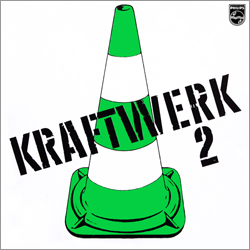
Kraftwerk 2 is the second studio album by German electronic band Kraftwerk, released in January 1972.

Kraftwerk is the debut studio album by German electronic band Kraftwerk. It was released in Germany in 1970, and produced by Konrad "Conny" Plank.

Radio-Activity is the fifth studio album by German electronic music band Kraftwerk, released in October 1975. The band's first entirely electronic album is also a concept album organized around the themes of radioactive decay and radio communication. All releases of the album were bilingual, with lyrics in both English and German. The album was accompanied by single release of the title track, which was successful in France and Belgium.

The Man-Machine is the seventh studio album by German electronic music band Kraftwerk. It was released on 28 April 1978 by Kling Klang in Germany and by Capitol Records elsewhere. A further refinement of their mechanical style, the album saw the group incorporate more danceable rhythms. The album has a satirical bent to it. It is thought to address a wide-range of themes from the Cold War, Germany's fascination with manufacturing, and humankind's increasingly symbiotic relationship with machines. It includes the singles "The Model" and "The Robots".
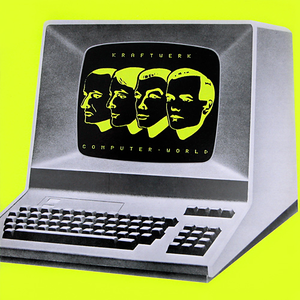
Computer World is the eighth studio album by German electronic band Kraftwerk, released on 11 May 1981. It was accompanied by four singles, including a double A-side UK no. 1 featuring "Computer Love".
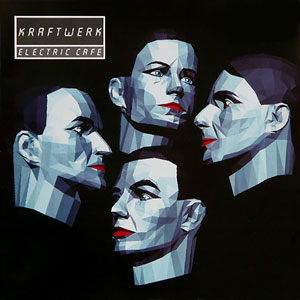
Electric Café is the ninth studio album by German electronic band Kraftwerk, released on 10 November 1986. The initial 1986 release came in versions sung in English and German, as well as a limited Edición Española release, featuring versions of "Techno Pop" and "Sex Object" with only Spanish lyrics. It was the first Kraftwerk LP to be created using predominantly digital musical instruments, although the finished product was still recorded onto analog master tapes.

The Mix is the tenth studio album by the German electronic music band Kraftwerk. It was released on 11 June 1991 by Kling Klang and EMI in Europe and by Elektra Records in North America. It features entirely re-arranged and re-recorded versions of a selection of songs which had originally appeared on Kraftwerk's albums Autobahn (1974) through Electric Café (1986). Some of the songs, such as "The Robots" and "Radioactivity", feature new additional melodies and/or lyrics.

Tone Float is the debut and only LP by the German band Organisation zur Verwirklichung gemeinsamer Musikkonzepte (Organisation). Organisation is best remembered for having the two founders of Kraftwerk as members, Ralf Hütter and Florian Schneider-Esleben, which they did after the album's release and band's disbandment.

Florian Schneider-Esleben was a German musician. He is best known as one of the founding members and leaders of the electronic band Kraftwerk, performing his role with the band until his departure in 2008.
Emil Schult is a German painter, poet and audio-visual artist.
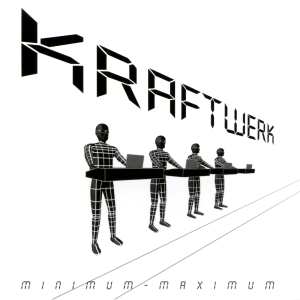
Minimum-Maximum is the first official live album release by Kraftwerk, released in June 2005, almost 35 years after the group gave its first live performance. The album features two CDs of tracks recorded on the group's world tour during 2004, including concerts in Warsaw, Ljubljana, Moscow, Berlin, London, Budapest, Tallinn, Riga, Tokyo, and San Francisco.

"Radioactivity" is a song by the German electronic music band Kraftwerk. It was released in May 1976 as the only single from their fifth studio album, Radio-Activity (1975). It sold 500,000 units in France.

"Autobahn" is a 1974 song by German electronic band Kraftwerk, being the second and lead single from their studio album of the same name. The song was composed by Ralf Hütter and Florian Schneider of the band, with Emil Schult collaborating on the lyrics. It was co-produced by Conny Plank, and is the band's first track to use sung lyrics. Recorded in 1974, the song is designed to capture the feel of driving on a motorway. "Autobahn" is Kraftwerk's biggest hit in the US, reaching number 25 on the Billboard Hot 100.

Exceller 8 is the title of a 1975 compilation album of music by Kraftwerk. It was released by the Vertigo label in order to capitalize on both the summer chart success of the single "Autobahn" and the imminent release of the next Kraftwerk album Radio-Activity. By this time, Ralf Hütter and Florian Schneider had set up their own record and publishing company, Kling Klang.

Klaus Dinger was a German musician and songwriter most famous for his contributions to the seminal krautrock band Neu!. He was also the guitarist and chief songwriter of new wave group La Düsseldorf and briefly the percussionist of Kraftwerk.

Radioland: Radio-Activity Revisited is a studio album by English improvising pianist and synthesiser player Matthew Bourne (musician) and French electronic composer Franck Vigroux, created to mark the 40th anniversary of Kraftwerk's seminal album Radio-Activity. It was released digitally by The Leaf Label on 4 December 2015, with physical copies following in early 2016.
